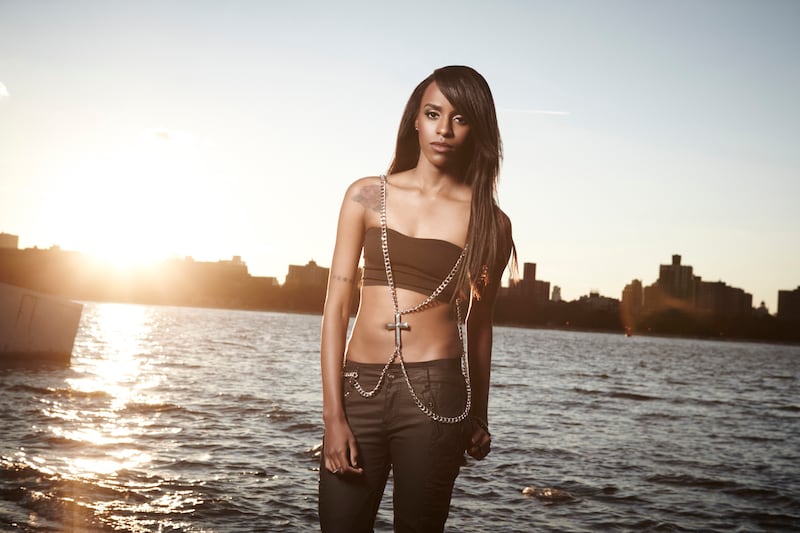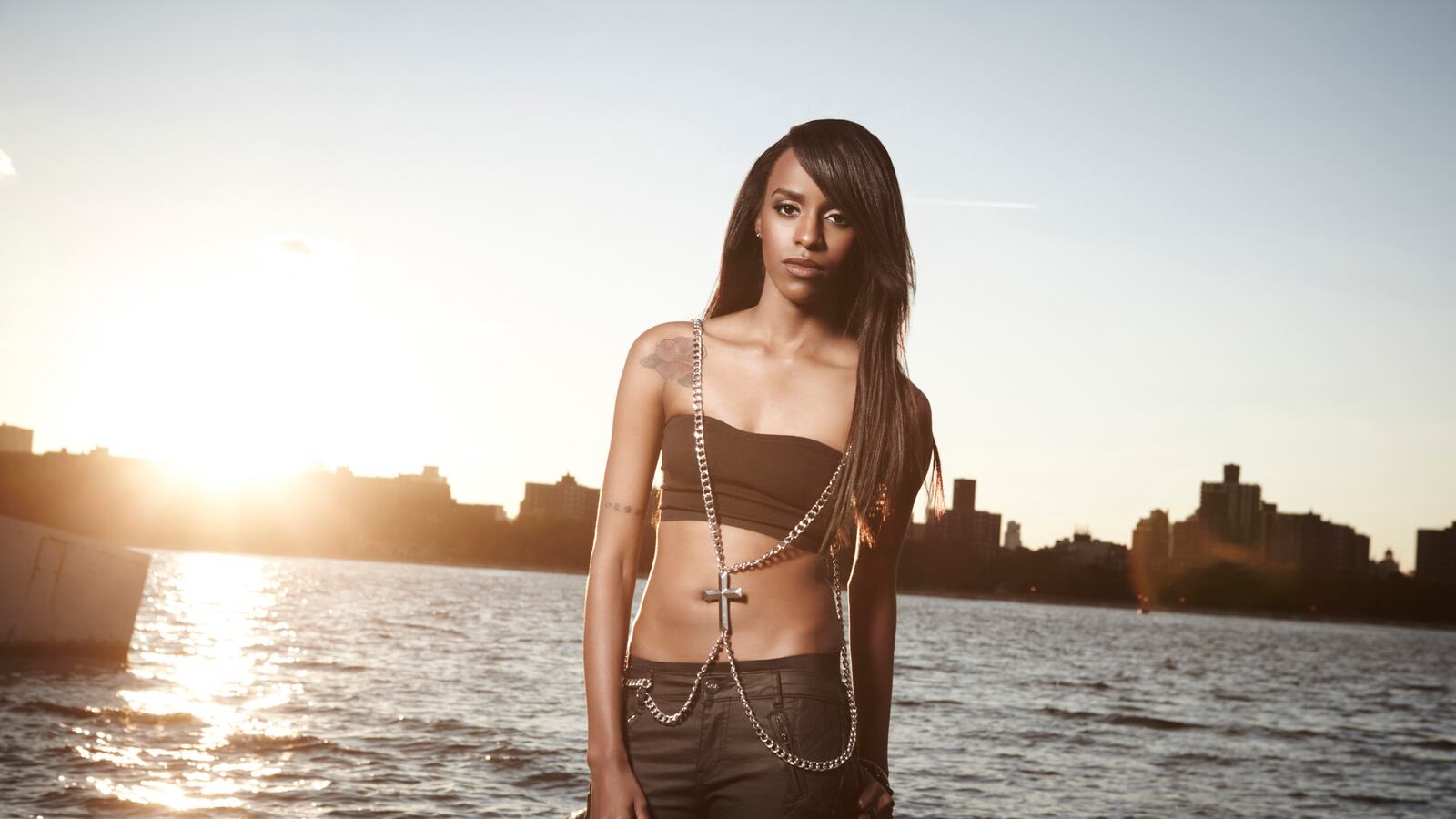Raykeea Wilson is gesturing in a windowless, green-walled conference room in Midtown Manhattan, cutting arcs with her hands as she describes her onstage persona. “She’s the person I don’t have the guts to be,” says the Brooklyn rap newcomer, whose friends call her Raeen. “She is the person I feel I was born to be and in some way will come into in life.”

She’s talking about Angel Haze, the never-gave-a-fuck force she werewolfs into when she rhymes on stage—with a kind of spitfire that inked the 21-year-old a record deal with Universal Republic just weeks after the release of her first mixtape, Reservation. There’s a lot of momentum for the Detroit-born Wilson at the moment: Pitchfork loved her mixtape; Fader compared her to Biggie Smalls; she was even featured in The New York Times. But perhaps most significantly, she’s sparked the most in-depth conversation in hip-hop since Frank Ocean came out—with the release of “Cleaning Out My Closet,” a jarring account of childhood sexual abuse.
Laid over a sample of Eminem’s song of the same name, “Cleaning Out My Closet” begins with a warning that “this might get a little personal—or a lot, actually.” And indeed, it does, as Haze dives right into her trauma: He took me to the basement and after the lights had been cut/he whipped it out and sodomized and forced his cock through my gut, she raps. A bar later: And then it happened like it happened like millions of times. In later verses she gets self-analytical, reflecting on how the pain she felt made her starve herself, consider suicide, and—in the fear and hate she felt for men—start liking girls.
It’s a devastating listen. And that’s her intention.
“It’s important to never, ever, ever filter it,” says Haze of her rhymes. “Because, once you get it, you’re like ‘Holy shit! Fuck! I feel uncomfortable—but this shit is real.’"
Haze hasn’t always been so unfiltered. Born in Detroit, she moved around as a kid, before settling in Springfield, Va., a suburb of Washington, D.C. It was in high school that a friend suggested she try her hand at rapping; she says she’d been writing music since she was a child. And so she did, uploading tracks to YouTube and later opting out of college—she’d been accepted to Penn State—to try to make it in the music world. Last year, she put out two mixtapes, and became the subject of the previously mentioned Fader profile that compared her to, yes, Biggie (with “a lot of issues,” the author wrote). Cut to August 2012 and she’s signed to Universal. Her big debut is due next year.
Girl rappers are in right now, we know—with Nicki Minaj at the top of pop and Azealia Banks, Kreayshawn, and others bubbling beneath. But in a market that’s suddenly crowded, Haze stands out for her creative tensions: equally acquisitive and inquisitive, wounded and invincible. She’s vulnerable in “Cleaning Out My Closet” while being anything but soft; on her biggest track, “New York,” she says she runs a city she just moved to in May.
Still, Wilson’s goal is not to join the masses—her this-is-me transparency refuses to be categorized. She’s bisexual, though it’s no big deal; she once tweeted that obsessing over her orientation is like letting her favorite color define her. She can get sensual, but not in the kittenish style usually prescribed for female musicians (see: “Like when you gonna let me fuck, bitch?” on “Werkin’ Girls”). Her circling introspections could earn her the label of conscious rap—if not for the “money is the only shit I’m after” chorus here and there.
Perhaps most prominently, Wilson’s identity is balanced, delicately, between the reserved Raeen—she describes herself as introverted and “afraid of the world”—and the force that has become her onstage persona. As Raeen, the young woman looks away when you ask her a question (though she delivers her answers clearly). She dresses modestly: rail thin, hair straight, close-fitting black top, understated gold necklace. Though she has a young face, worry lines are building above her eyebrows.
And yet as Haze, she’s ferocious—dropping lines like “I’m an undefeated bastard/my tongue is the fucking rapture.” In the new video for “Gossip Folks”—a braggadocio that takes its beat from the Missy Elliot track—she glares into the camera. “Just a month ago I was a no-a-body,” she bursts out, “and now everybody wanna fuckin’ know about me?”
Raeen says being able to turn on Haze is like having a super power. “Like when Spiderman puts on his mask, goes into the world and just fucks shit up,” she says. “That’s what I want to do all the time. Fuck. Shit. Up,” she emphasizes, chopping the air with each word.
Like most of us, Angel Haze is complex—and that’s what makes her relatable. She talks about having a relationship with her fans, one that is evidenced by her constant stream of philosophy waxed and shit talked with her 26,000 Twitter followers. If you want to ask her a question on her Tumblr, you click on “Don’t Ask Dumb Shit.” But perhaps most importantly, her fans know she comes from the same nebulous place as they do.
“I’m confused about everything in life,” the young woman says. “How we came to be, why we are the way we are, why I am who I am …” You know, just the “normal things people think about that you never really get an answer to.”
Whether Haze or Wilson, that’s how this artist fucks shit up: by getting at issues in her music that would otherwise be untouched—and breaking them wide open. “You have to be honest … unwaveringly honest,” she says. “The type of honest people don’t expect.”
As she says near the end of “Cleaning Out My Closet”: “There’s a fucking reason for every scar I show.”
This story was produced in partnership with TUMBLR STORYBOARD.





